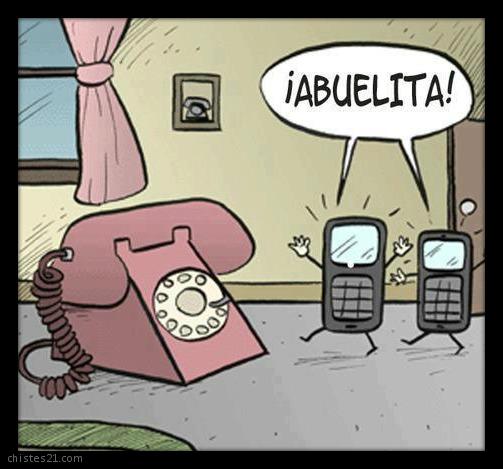Do you remember Kodak and Blockbuster? I do. My students do not.
Listen to the man in the NYT video about the death throes at Kodak:
What if? What if somebody else would have been a little more innovative? What if the board would have thought, let’s think a little bit farther out?
 And Blockbuster? When baby Netflix showed up and proposed a partnership, Blockbuster executives laughed the Netflix CEO out of the room.
And Blockbuster? When baby Netflix showed up and proposed a partnership, Blockbuster executives laughed the Netflix CEO out of the room.
Are we doing the same thing with world language teaching?
In the recent furious debate over whether computer coding could replace foreign language as a requirement for college-prep high school diplomas (NOOOO!), I joined the voices on the side of world language. Like most language teachers I know, I got distracted by the cute kitty, the debate on whether or not coding was a language, and I completely missed the crouching Bengal at the door: why didn’t it occur to me/us that coding would nearly replace the need to learn a foreign language at all?
I need you to take off your language teacher advocate hat right now. I had to pry mine out of the Gorilla glue that stuck it to my head and lose some hair and skin cells with it in order to write this post with the open mind I want but am so terrified of.
Is technology replacing the need for our profession?
Deep breath.
Yes.
That is, mostly, yes. But take heart, we’re not alone. Technology has been sounding the death knell on the traditional classroom for some time. Don’t take my word for it. Seriously, do your school and yourself and our profession a very important service and blow your mind for 20 minutes by watching this TED talk (my favorite, ever) from 2013.
Did you catch this quote?
The education system is wonderfully constructed. It’s not broken. It’s just that we don’t need it anymore.
Did you catch what the kids said about how much they needed a teacher to teach them language so they could talk to people around the world?
You’ve given us a machine that works only in English. So we had to teach ourselves English in order to use it.
Did you hear Mitra’s follow-up comment that ought to rock our education system to its core?
That’s the first time as a teacher that I heard the word[s] ‘teach ourselves’ said so casually.

Come on, let’s take a deep breath and suck it up and keep walking where this is taking us.
Coding is not a language, but it won’t matter.
As reported by NPR, Florida’s world language teaching organization president is just one of the many, many educators who came out in this fight to show legislators that coding simply cannot count as a world language requirement:
World languages meet the needs of the business industry today…. [Business leaders are] in agreement. If they need to hire someone for a job, world language skill is going to trump any other skill they feel they can train them on the spot.
As reported by NBC, ACTFL’s 2015 outstanding Teacher of the Year Edward Zarrow adds,
I fully recognize and respect the place that technology and computer science has in 21st century education. Technology is no longer merely a tool for education — it is part of our educational culture. But to suggest that coding and computer programming ought to fulfill the world language requirement in Florida, or anywhere else for that matter, is wrong-headed and completely misses the point of why the study of world languages is a critical part of a 21st-century education.
I fear, however, that in focusing on whether or not computer programming could replace the credits, we’ve completely missed the point that the study of one may greatly reduce the need of the other.
And we forgot to listen to the kids:
Alexander Olson says he’s forgotten a lot of the Spanish he took for two years in middle school, and wishes he had learned coding instead: “This would have stuck with me a lot longer.”
And we forgot to listen to educators in other fields trying to give us a gentle nudge (from Edutopia):
Computer programming jobs are growing at twice the national average… So while our home state of Texas doesn’t count computer science toward math and science, allowing programming to count as a foreign language is a big step in the right direction. … Now that computer science is the highest paid career for college graduates, it is time to stop teaching students how to push the buttons and start teaching them how to make the buttons.
And we forgot to listen to the parents:
The majority of kids will never use the language they learn, nor will they ever become fluent in it. Giving them the option to learn a computer language instead could possibly open doors to careers in computer programming that might not have otherwise been an option for them.
In the broader marketplace are you more likely to be hired for your language skills or coding?
It doesn’t have to be one or the other, of course. But in the economy of time, it may become that way, and we’d be wise to listen to this foretaste of things to come from a company-owning parent who is on our side (same NBC article), who “doesn’t think allowing substituting coding for foreign language study is appropriate” but “concedes that his own company is begging people with coding knowledge to work for them.”
We don’t want it to be one or the other, but we see Kodak and Blockbuster and though change outside the capitalist marketplace takes a lot longer, we know how this will turn out. But we want to believe it can be both. Take a look at educator Pam’s comment on Edutopia:
While I cannot argue that computer science is a valuable skill to have in the 21st century, I certainly wouldn’t replace learning a second language with that skill. I believe that there is room for both in today’s curriculum. In fact, I believe that both are necessary. We need people who can create new software, but we also need people who can communicate with people, not just machines.
She’s right. Both are necessary. But that doesn’t mean both will be necessary.
And this makes people sad and frustrated. People like me and my heart that’s happiest when I’m teaching Spanish in some capacity. People like commenter “Brim Stone” on that NPR article:
It is simply astounding that we have gone so far down the alienating, dehumanizing wormhole of modern technology that we are actually choosing to teach kids to speak to machines rather than to other human beings.
But here’s my question: what if the “dehumanizing wormhole of modern technology” is creating machines that enable kids to speak to exponentially more human beings than they could have otherwise, regardless of how much time or aptitude they could dedicate to language learning?
Here comes the Babel fish.

(For those of you who don’t know why I keep talking about a Babel fish.)
I first learned that the Babel fish has already been invented from Melanie Stilson. “It’s kind of scary, right?” she asked.
Oh yes.
I’ll start burying my head in the sand and say, but wait, translators are terrible. Everyone knows how badly they work… um… when you run them through 14 languages and then back through English again… and then still sometimes they work. The truth is that even two years ago, Google Translate was so good that people had to either look very hard or run text through a dozen languages to get significant meaning problems. It’ll happen this year too. Around the back-to-school time, you’ll see posts and tweets about how to show your students that Google Translate doesn’t work. Pull your head out of the sand with me. Google Translate does work, and it works well. And it can be used to communicate. And it can be used on your phone, with a camera, to read in 29 languages.
Okay, that’s reading. The text-to-speech has been much more problematic. Here I go, burying my head back in the sand… technology will never be able to translate spoken language in real time. Will it?
But before I open my mouth to talk about how much no technology will ever replace the need to learn a language and get a mouthful of sand, let’s meet the Pilot. (Babel fish was copyrighted, I guess.)
I’ve wrestled with the arguments already. They cost $200 a pair. You can see the rich/poor disparity happening already right? But let’s look at the facts. The poor don’t go places where they need a new language. The rich come to them with humanitarian aid and offers of help to go places where they will need a new language be able to afford Pilot. And the rich bring Pilot with them. “Put this in your ear,” says the nurse. “Can you tell me what happened, how you hurt your leg?” You can see it, right?
Melanie asked, “How can we make learning languages as compelling as band?” After the invention of the Babel fish? We can’t. The ones who were intrinsically motivated to do it because it’s cool will do it anyway. And what does that mean? It means learning all world languages will go the way of Latin. Kids will do it, but only the ones who would have anyway in the absence of nearly any external reason to do so, or the ones seeking to involve themselves in some highly specific niche such as producing more translations of (perhaps already over-translated?) ancient texts.

An analyst on the Kodak situation (Amer Tiwana, CRT Capital Group) gives us more insight on the real issue here:
The question isn’t tech-related, it’s competition.
And for us? This question isn’t about what’s good for the brain. It’s not even about the technology. It’s about competition– not for a film product, but for time. As Daniel Pink points out, people have a limited amount of time and effort to dedicate to their pursuits, and they have a lot of very good options to choose from. When I have to choose between a gym membership and sleep, I buy a workout DVD stream a Jillian Michaels workout on my iPad because I can do it while my kids are awake, which means I can stay asleep as long as they do. When I have to feed them three squares a day plus snacks and teach them the alphabet, the Rosetta Stone Russian goes on the shelf and stays there. For years.

Should people give up brain benefits and connections super-personalized by the words leaving their mouths instead of routed through an earpiece? Maybe not. Will they? Yes. Because it’s 2030 and [functional programming on the thing that builds the thing that builds the car that drives itself while they play the 32nd step past Pokemon Go] is calling for their time and yes, they will.
So it’s the beginning of the end. What now?
I’m not going to lie, I’m scared, but not scared enough to deny reality and go be a hermit. I want my fear to inspire me to figure out where we’re really going from here. And a conversation with my friend Laura Sexton helped me navigate that. She reminded me that a primary purpose of language teaching has always been to foster empathy, which reminded me of the one-word secret to teaching culture: inquiry.
ACTFL TOY Zarrow hinted at it as well:
There are numerous reasons why we study and learn world languages apart from meaningful communication. If we want to prepare our students at every level to be ready for the challenges of a multi-cultural, multi-lingual, and global society, we need to lead with world languages.
Melanie hinted at it, too:
We just have to adapt and figure out how to 1) use the technology to our advantage, and 2) make what we teach meaningful beyond what the technology can do.
I’m a little past the mind bending that came with all this information. Now, I’m prepared to say that if this means that world language classes become less about language and more about the intercultural empathy that will keep us human in the dehumanizing wormhole of technology, I can live with that. I hope I can also work with that.
Meanwhile, I’m thinking about reserving my own pair of Pilots.
6 Comments
Comments are closed.




Yikes! What a terrifying, but well-written, post!
http://www.lightninglanguagevlog.com/#!Response-to-Post-BabelFish-What-now-at-Musicuentos-How-can-we-keep-language-learning-alive-with-technology-poised-to-overwhelm-us/cmja3/579f4b1f0cf233f0ee8de0e8
Many thanks for bringing this issue to the blog dialog. I think as professionals we need to acknowledge our fears and work to address them. Click the link above to see my full response 🙂
Wow! What a lot to think about… You’ve given us the big question. Now I think language teachers need to come together in SOLEs to work out the future of learning that will start in our classrooms this month. Would you consider presenting these ideas (for discussion) at the Kentucky World Language Association Conference this fall? Thank you so much for sharing your insights!
Well, I’ll be at KWLA presenting a workshop and a session – anyone up for collaborating with me on a roundtable discussion on this topic? That would be a great learning experience, I think. I don’t have a lot of answers right now – just a lot of “what if,” and 2 new goals for the year thanks to them.
[…] inspiration for this post came from something that Sara-Elizabeth recently shared on Musicuentos, the invention of the Babel Fish. She got a surprising amount of pushback on Twitter, because although she made me think about the […]
[…] please hear me out. I have a lot of reasons for saying this, mostly having to do with advances in technology and motivation. I believe the primary goal of our language classes is […]